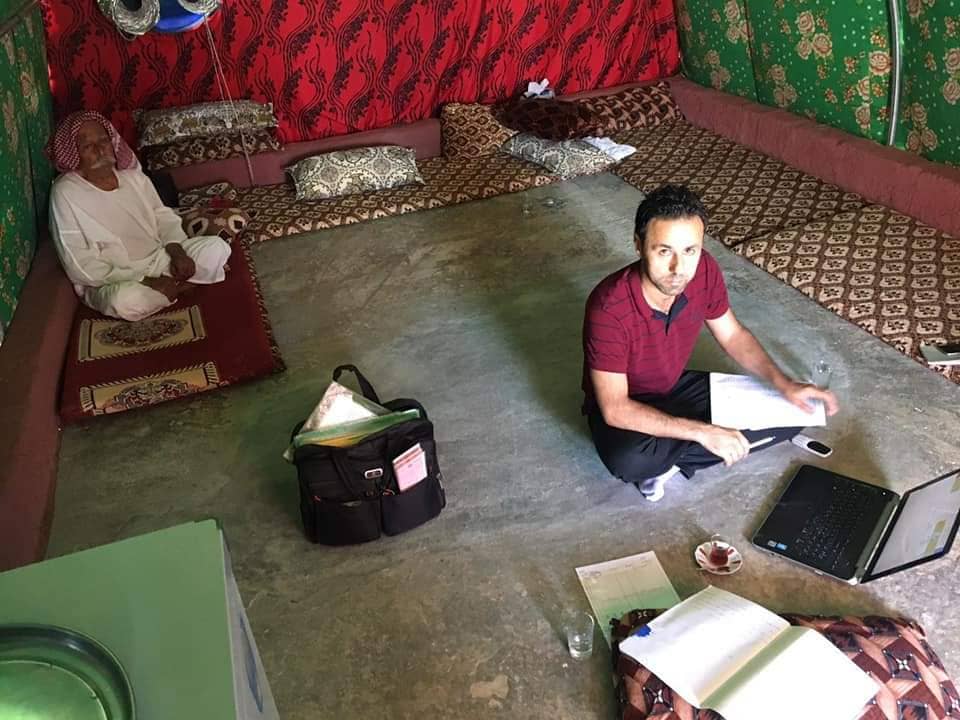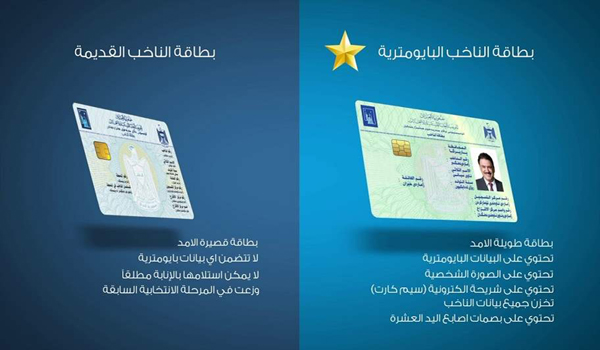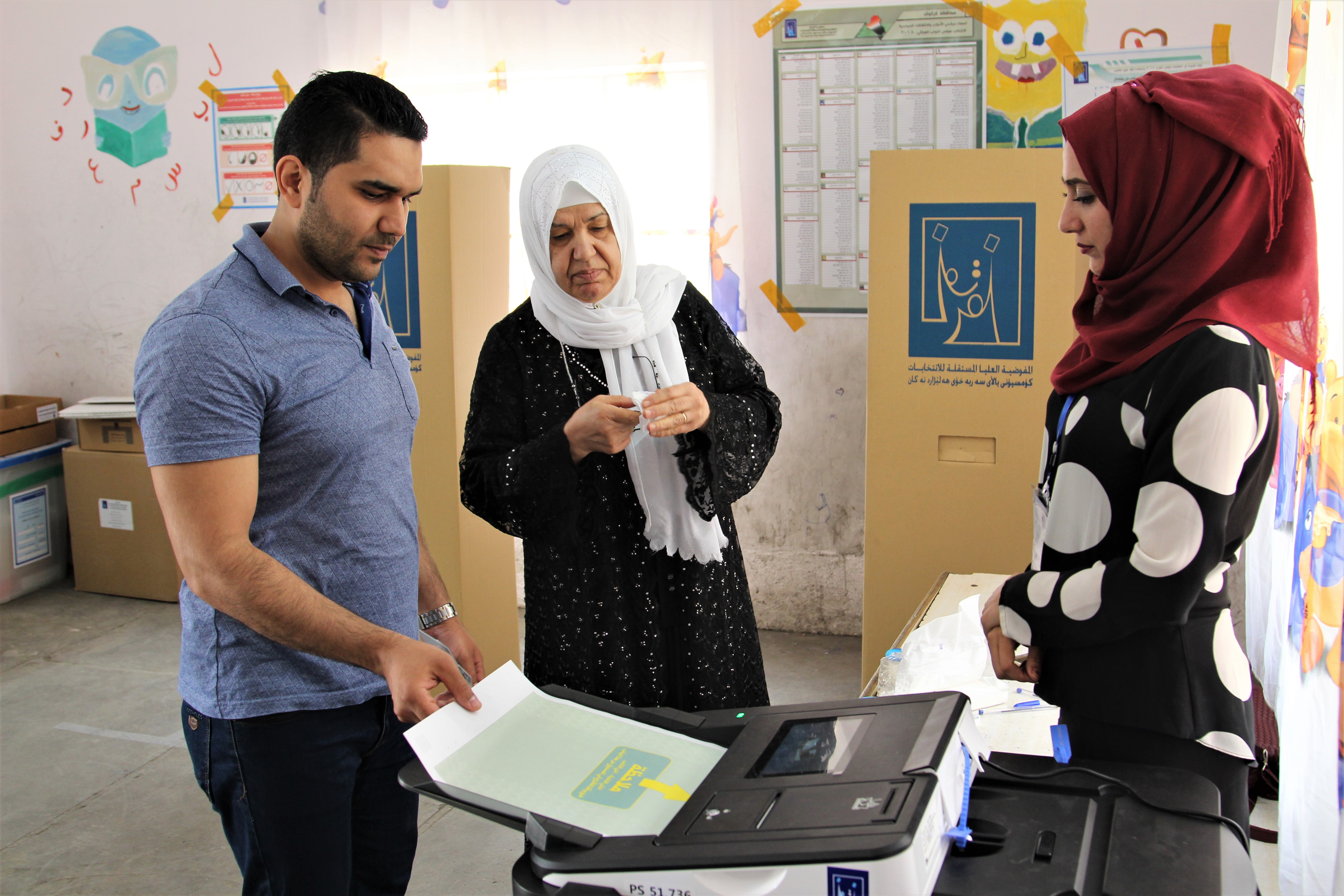After a year and half of the 2018 federal elections, thousands of Iraqi citizen took to the street to change the status quo political system and the electoral laws of Iraqi High Electoral Commission (IHEC), one of the groups who suffered from the unjust voting procedure of the 2018 federal elections was Internally Displaced People (IDPs).
Lack of national ID and elections cards, security measures, distance of the polling stations, and political pressures were obstacles to the participations of thousands of IDPs.
Through investigations, KirkukNow has learned that 450 thousand IDP voters were deprived of voting due to the mentioned reasons and majority of IDP votes were cancelled for different reasons.
“I went to the election commission several times, but my name was not registered so I was deprived of voting,” Shirin Qassem, 45, said.
Shirin has left her hometown, Sinjar, since August 2014 and strove to have her vote in the elections. She could not vote even though she registered herself for the election card.
According to statistics of IHEC and Organizations that observed the elections, thousands of people’s names were not added to the voters’ lists.
Shero Samu, director of Mam Rashan camp in Sheikhan district, said, “only in our camp, one thousand and 100 IDPs voters names out of four thousand and 100 were registered to the voting list. The rest lost their right to participate in the elections.” He also said besides that, the distance of the polling stations was another barrier.

Nineveh, a mobile team of IHEC is registering an IDP in his tent for election card, 2019. Photo: IHEC media
IHEC had set numerous procedures for the IDPs to vote who were mostly in Nineveh, Kirkuk, Salahuddin, Anbar, and Diyala.
Election card or a temporary card with National ID were required to vote. Some of the IDPs, either under the rule of Islamic State group (IS) or while becoming displaced, lost their documents including their national IDs, depriving of the right to vote.
“We came to Kirkuk from Tikrit after leaving IS, they took all of our documents to register us for election cards. I never saw my documents again. Four members of my family were eligible to vote, but lack of national IDs deprived us of voting,” Zuhir Mohammed said.
Mohammed, displaced since 2015, stated that many candidates visited them in the camp during the election campaign, gave them food and took their ration cards to issue their election cards, but “we neither saw the candidates again, nor the election cards.” He claimed hundreds of IDPs in the camp faced the same situation.
Until early 2019, at least, 156 thousand IDPs did not possess official documents, according to a statistics published by Human Rights Watch (HRW) in June 2019.
The United Nations statistics also supported that thousands of IDPs have lost their official documents in displacement, causing many to lose the chance of legal and governmental procedures. As a result, particular offices have been opened in many camps and liberated areas to issue state documents for the IDPs.

The difference between biometric national ID and election card used in the 2018 may federal elections
In Sinjar, two thousand families could not cast their votes due to the loss of their official documents, according to a statistics given to KirkukNow by IHEC.
Mahir Rasho, head of Essyan camp in Zakho district, stated, “among five thousand IDPs in this camp, nearly 70 percent do not not have biometric card… beside mistakes and unavailability names in the voters lists, a significant number of voters did not have official documents including national ID, citizenship, and passport.”
“Last election was the worst for the IDPs. There were not preparations and many people’s rights were deprived,” he said.
According to statistics KirkukNow obtained, the turnout of IDP votes did not reach 40 percent.
During 2018 federal elections, majority members of more than 20 thousands IDP families in Diyala province were eligible to vote.
Hassan Pir-Wali, head of media of IHEC in Diyala province, said, “in the province, one polling stations was opened the day before the election day for the IDPs in Khanaqin district. So IDPs did not vote.”
Ali Ghazi, head of Displacement and Migration Ministry office in Khanaqin, said, “prevention and obstacles were significant including setting up only one polling station whose door was open for a few hours. That is why majority of the IDPs did not vote.”

Kirkuk, a person is casting his vote in Kirkuk, 2018. Photo: KirkukNow
Iraqi Observatory for Human Rights, in March 2018, published that majority of the 450 thousand IDPs who were divided over 131 camps faced great pressures form the candidates to vote for them in the elections, besides the suspension of elections cards of thousands of IDPs who “were supporters of IS or killed in the war against IS.”
“Numerous employees at the camp publicly intimidated us to vote for some particular candidates, but we disagreed and did not vote,” Sa’ed Ilyas said.
Ilyas is an IDP from Sinjar and lives in Duhok. He is concerned about election intimidations. “The process means democracy but has become dictatorial for us.”
According to the electoral law for the elections of the Council of Representatives, any Iraqi citizen, who fulfils the requirements, can vote secretly and directly and one can vote for another person.
We could not vote due to three reason; distance of the polling stations, security barriers to a free traffic and mobility, and the intense ethnic and tribal competitions. No one cared about the poor,” said Hamddiya Hamdani, eight members of her family did not vote in the elections.
She has returned to her village in Dibis district in Kirkuk and said, “even if I had voted, I would have regretted it because I would have voted for people who would waste my vote.”
Prior to the 2018 federal election campaign, KirkukNow revealed that election fraud had been committed especially “buying” IDPs votes in return for an amount of money, reaching 100 dollar, or goods such as food.
Ammar Sabah, head of Displacement and Migration Ministry office in Kirkuk, spoke to KirkukNow on election fraud and said, “we live in Iraq and hear every kind of news… but that case was not recorded formally.”
He also said that despite that they facilitated for IDPs movement on the Election Day, the election process was inactive and the turnout was low.
IHEC, in May 2018, issued a statement in which it indicated that they would impose harsh punishments on those commercializing election cards.
These resulted in the cancelation of the thousands of votes of many polling stations, in particular those that were allocated for the votes of IDPs.
Hamdi Abdul-Baqi, coordinator of Shams Network for Election Observation, said, “votes in 240 IDP election stations were not counted.” He thinks that neglecting the votes of IDPs is a human right violation and IHEC should have organized the election better.
Shams Network for Election Observation published reports on election violations in many regions in Iraq, showing the interventions of the security forces, the inefficiency of election electronic devices and the unavailability of voters’ names in the voters list.
Rebwar Hadi, head of Legal Affairs Committee, said, “cancelling the votes of the IDPs was because it was said that some of them voted twice, or people voted instead of other people, but based on the new electoral law, biometric cards will be required to vote, and with that guaranteeing the votes of the IDP will be up to IHEC.”
Hadi explained that the new law allows IDPs vote regardless of where they live.
Duhok,Kabartu Camp houses Nineveh IDPs, 2019. Photo: KirkukNow
Masoud Darakhan, an election observer, said, “in the last election, for instance, IDPs in Jalawla or Sa’diya had to go back their places of origin to vote, people feared and did not go back to vote.”
KirkukNow learned that militia forces intimated the IDPs and prevented them from voting, however, KirkukNow could not collect full evidence for such intimidation.
The IHEC teams also face obstacles of the security forces. In December 2019, a team of IHEC was not permitted to enter a camp in Kirkuk to hold seminar on the next elections.
Farman Fatih, head of Shams Network for Election Observation in Kirkuk, said that on the election day multiple rockets were targeted at numerous polling stations, beside the observation of the security forces that discouraged people from going to the polls.
According to the former electoral law, federal government were obliged to implement eight points to organize the elections including the return of IDPs to their places of origin, securing the participation of people in the elections, and having polling stations for IDPs in different provinces.
Bahar Mahmood, a member of Legal Affairs Committee in Parliament, stated that no steps have been to the return of the IDPs and guarantee that their votes will not be cancelled in the next elections.
According to the latest statistics of the Ministry of Displacement and Migration, 86 camps still houses thousands of IDPs and only in 2019, two thousand people returned to the camps after moving back to their place of origin and had not been able to settle again.
786 thousand IDPs still live in the Kurdistan Region and majority of them do not have biometric ID cards, which is the main requirement to vote in the next election, according to the Joint Crisis Coordination Centre of the Kurdistan Regional Government.
Yet, the answer to this question is not clear: will the IDPs again be deprived of their rights to vote in the next Iraqi elections?
*Ammar Aziz in Duhok, Karwan Salehi in Kirkuk, Amir Khanaqin in Diyala have contributed to this investigative report.




